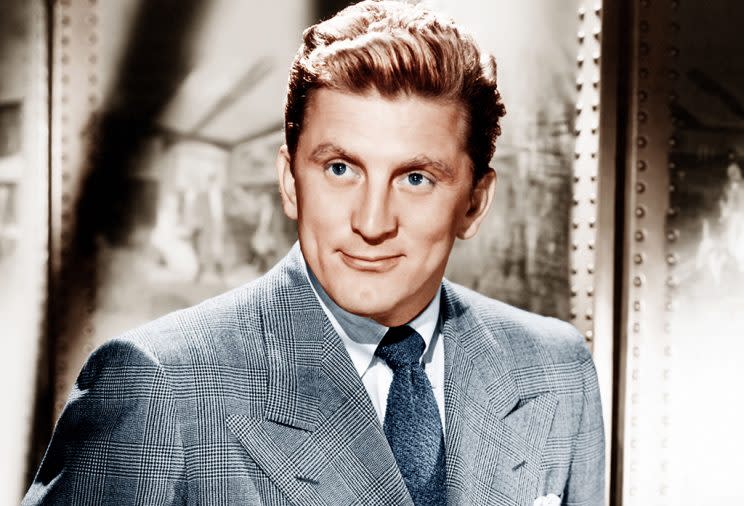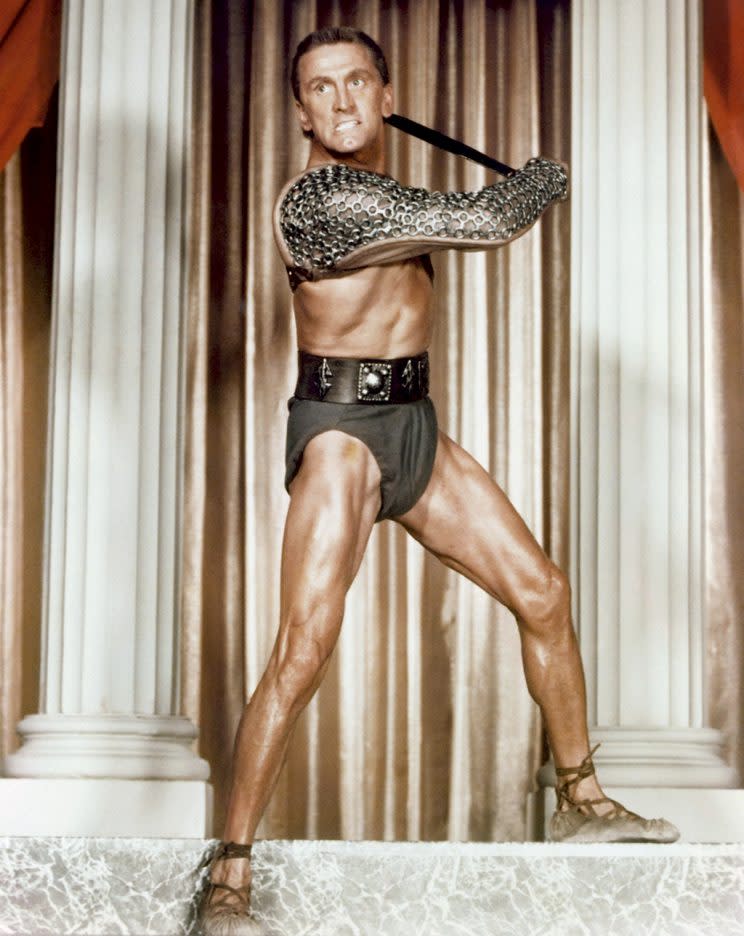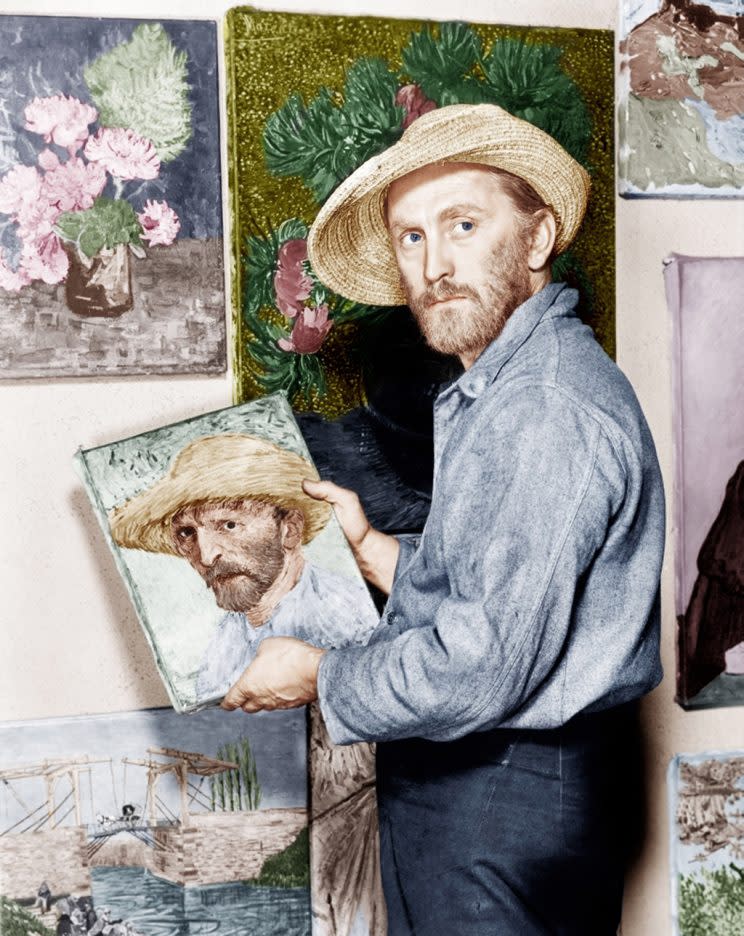Kirk Douglas Turns 100: A Tribute to the Screen Legend and 6 Essential Movies

By Carrie Rickey
Kirk Douglas resembles an Easter Island monolith, only with blue eyes and a cleft chin. His face, disproportionately large, is primeval, while his acting is intense and modern.
While not (yet) as enduring as the South Seas statuary, the prolific actor celebrates his 100th birthday on Dec. 9. He is one of the last great 1950s stars still standing.
Douglas once boasted that he made his career playing sons of bitches. This is not quite accurate. What is true is that he was a star who didn’t much care about cultivating a sympathetic persona. Mostly he played tenacious guys, like the real-life gladiator-hero that led a slave uprising against Rome in Spartacus. Or like Jonathan Shields, the opportunistic producer estranged from friends and lovers in The Bad and the Beautiful. Or Vincent van Gogh, the moody post-Impressionist who pushes away those who care for him in Lust for Life.
The son of Russian Jewish immigrants, Douglas was born Issur Danielovitch in 1916 in the upstate New York hamlet of Amsterdam. He was the fourth child — and only boy — of seven siblings.
As Douglas told it his 1988 autobiography The Ragman’s Son, his family was so poor that Issur and his father employed the peasant method of insulation: Through spring and summer, they collected horse manure, and in the fall, they spread it around the base of their house to keep the heat in. Poverty didn’t insulate Issur from dreams of acting. He was hooked from the moment he recited a poem in kindergarten, and the class applauded. “I liked that sound,” he wrote. “I still do.”
His father’s lack of ambition stoked Issur’s own. The son worked many jobs to save money for college and enrolled as a work-study student at St. Lawrence University. Even then, he was magnetic: Despite the pervasive anti-Semitism on campus, he was elected student-body president.
After a brief career on Broadway (during which he changed his name) and an even briefer stint in the Navy (during which he married Diana Dill, his first wife and mother to his son Michael), he went to California. Douglas’ friend Lauren Bacall, who had a teenage crush on the actor, talked him up to Casablanca and True Grit producer Hal Wallis. The actor would spend his next 70 years in Los Angeles, 62 of them (and counting) with his second wife Anne.

First, he was an electric actor. Then, he was one of the first actor-producers, tapping a young director named Stanley Kubrick for Paths of Glory (1957) and Spartacus (1960). Douglas bought the rights to Ken Kesey’s novel One Flew Over the Cuckoo’s Nest, thinking he might play outlaw asylum inmate Randle McMurphy on screen. After assigning the rights to son Michael, he reluctantly ceded the lead to Jack Nicholson for the 1975 movie. In the 1970s, Douglas started writing — novels, memoirs, and more memoirs. In all, he has three Oscar nominations and one honorary statuette to his name. He has bounced back from heart surgery, a stroke, and other medical setbacks. He may very well be immortal.
Though Douglas made many great films in the 1940s — including Champion (1949) — and in the 1960s — including Lonely Are the Brave (1962) — the essential Douglas performances are between 1950 and 1960. His specialty was driven, often self-destructive, men who have trouble making emotional connections. It’s a recurring theme in his films, especially these six:
Young Man With a Horn (1950)
As jazz trumpeter Rick Martin (loosely based on cornetist Bix Beiderbecke), Douglas struggles to hit that unattainable high note to the exclusion of all else. He wrestles with his horn, scarcely noticing adoring looks from singer Jo Jordan (Doris Day). One thing that diverts Rick from his music is the troubled, closeted Amy North (Lauren Bacall). Douglas gives a remarkably physical performance, both virile and vulnerable. (Available on iTunes)
Watch a trailer for ‘Young Man With a Horn:’
Ace in the Hole (1951)
Douglas plays Art Tatum, a disgraced New York reporter who lands at an Albuquerque daily and then finds the story of a lifetime. On a hunt for Native American artifacts, the owner of a trading post is trapped in a cave collapse. Tatum insinuates himself into the lives of the man’s family and prolongs the rescue effort in order to sell an exclusive to a New York paper. This opera of cynicism directed by Billy Wilder boasts Douglas’ most brazenly opportunistic performance. He’s like a boxer taking pleasure in hitting below the belt. (Available on Amazon, YouTube, Vudu, and Google Play)
Detective Story (1951)
William Wyler’s adaptation of Sidney Kingsley’s play about a day in the life of New York’s 21st precinct revolves around self-righteous Det. McLeod (Douglas) and his attempts to prosecute an abortionist (George Macready). Not unlike his counterpart in Ace in the Hole, McLeod is a professional who crosses ethical lines and judges everyone but himself. (Available on iTunes, Amazon, YouTube, Vudu, and Google Play)
The Bad and the Beautiful (1952)
This Vincente Minnelli Hollywood melodrama is perhaps the most purely enjoyable film on the Douglas filmography. He plays charismatic producer Jonathan Shields who serially makes and exploits a director (Barry Sullivan), a starlet (Lana Turner), and a screenwriter (Dick Powell), marshaling his considerable powers of seduction to woo them before revealing his full fury. (Available on Amazon, YouTube, Vudu, and Google Play)

Lust for Life (1956)
Douglas is superb in Minnelli’s riveting character study of Vincent van Gogh, obsessive, depressive, and socially awkward. (To keep himself off-balance, the actor kept one shoe untied.) Here, the rage Douglas ordinarily expresses at other characters is expressed inward. The result is a classic portrait of the artist as both creator and destroyer. (Available on iTunes, Amazon, YouTube, Vudu, and Google Play)
Spartacus (1960)
Broadswords and sandals! When Douglas asked for the part of Ben-Hur and was denied, he optioned the story of the slave who comes to lead a rebellion against the Romans. As ultimately directed by Kubrick (after original director Anthony Mann was removed), Spartacus is a rousing story of Roman patricians enjoying gladiatorial combat until one of the gladiators escapes and assembles an army. Subtle, Douglas is not. But as Spartacus, his brute strength, righteousness, and sensitivity to fellow slave Varinia (Jean Simmons), makes this the most satisfying of epics. (Available on iTunes, Amazon, YouTube, Vudu, and Google Play)
Watch Douglas in ‘Spartacus:’

 Yahoo Movies
Yahoo Movies 
